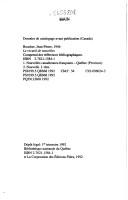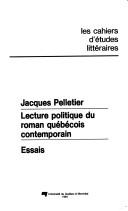| Listing 1 - 7 of 7 |
Sort by
|

ISBN: 2762115841 9782762115840 Year: 1992 Publisher: Ville St-Laurent : Fides,
Abstract | Keywords | Export | Availability | Bookmark
 Loading...
Loading...Choose an application
- Reference Manager
- EndNote
- RefWorks (Direct export to RefWorks)
Book
ISBN: 2890312941 9782890312944 Year: 1997 Publisher: Montréal, Québec : Triptyque,
Abstract | Keywords | Export | Availability | Bookmark
 Loading...
Loading...Choose an application
- Reference Manager
- EndNote
- RefWorks (Direct export to RefWorks)
Book
ISBN: 2760326578 9782760326576 9782760326569 2760326586 Year: 2018 Publisher: Ottawa Presses de l'Universite d'Ottawa
Abstract | Keywords | Export | Availability | Bookmark
 Loading...
Loading...Choose an application
- Reference Manager
- EndNote
- RefWorks (Direct export to RefWorks)
Thomas Chapais est une des grandes figures politiques et intellectuelles canadiennes-françaises du début du XXe siècle. Nommé au Conseil législatif de Québec en 1892, puis au Sénat du Canada en 1919, il a joué un rôle de premier plan dans les débats entourant la réforme du système d'éducation du Québec et dans les crises scolaires du Manitoba et de l'Ontario. Pourtant, c'est surtout de l'historien et non de l'homme politique dont on se souvient aujourd'hui. Biographe de Jean Talon et du marquis de Montcalm et auteur d'une importante synthèse d'histoire du Canada, Thomas Chapais formule un récit d'histoire cohérent qui contribue à l'avancement des connaissances et qui alimente d'importants débats historiographiques. Ses travaux forment un jalon essentiel dans l'histoire de la culture intellectuelle du Canada français. L'historien est en effet le dernier grand représentant du loyalisme canadien-français, doctrine qui repose notamment sur une interprétation particulière de la Conquête de 1760. Dans cette première étude d'envergure consacrée à Chapais, Damien-Claude Bélanger se penche sur son oeuvre d'historien pour comprendre son émergence, son contexte socioculturel, ses idées fortes, son influence et son destin critique. Ce livre est publié en français. - Thomas Chapais is one of the great French-Canadian political and intellectual figures of the beginning of the 20th century. Appointed to the Legislative Council of Quebec in 1892, then to the Senate of Canada in 1919, he played a leading role in the debates on educational reform in Quebec as well as in the Manitoba and Ontario school crises. Notwithstanding, he is mainly remembered today as a historian and not as a politician. Biographer of Jean Talon and of the Marquis de Montcalm, and author of a remarkable overview of the history of Canada, Thomas Chapais weaved a coherent historical narrative, contributing to the advancement of knowledge and to important historiographical debates. Chapais occupies a leading place within the history of intellectual culture in French-Canada. Chapais the historian was indeed the last great representative of French-Canadian loyalism, a doctrine notably based on a particular interpretation of the 1760 Conquest. In this seminal work on Chapais, D.C. Bélanger probes the historian's writings to better understand its emergence, its socio-cultural context, the main tenets of this thought, its influence and its critical legacy. This book is published in French.
Historiens --- Chapais, Thomas, --- Canada --- Histoire --- Historiographie. --- French-Canadian history. --- French-Canadian politics. --- Thomas Chapais, Canada, Québec, historiographie, histoire intellectuelle, conservatisme, loyalisme. --- Thomas Chapais. --- biographie. --- biography. --- figures politiques. --- histoire canadiennes-françaises. --- historian. --- historien. --- political figure. --- politician. --- politicien. --- politiques canadiennes-françaises.
Book
ISBN: 2890370836 9782890370838 Year: 1981 Publisher: Montréal, Québec : Québec/Amérique,
Abstract | Keywords | Export | Availability | Bookmark
 Loading...
Loading...Choose an application
- Reference Manager
- EndNote
- RefWorks (Direct export to RefWorks)
Motion pictures --- Motion picture plays --- Cinéma --- Scénarios de cinéma --- History --- History and criticism --- Histoire --- Histoire et critique --- Motion picture plays, French-Canadian --- Cinéma --- Scénarios de cinéma --- History. --- Motion pictures - Québec (Province) - History --- Motion picture plays, French-Canadian - History and criticism

ISBN: 2892760062 9782892760064 Year: 1984 Volume: 1 Publisher: Montréal, Québec : Presses de l'Université du Québec,
Abstract | Keywords | Export | Availability | Bookmark
 Loading...
Loading...Choose an application
- Reference Manager
- EndNote
- RefWorks (Direct export to RefWorks)
French-Canadian fiction --- Political fiction, French-Canadian --- Politics and literature --- Politics in literature --- History and criticism --- French-Canadian fiction - 20th century - History and criticism --- Political fiction, French-Canadian - History and criticism --- Politics and literature - Québec (Province) --- Roman quebecois --- Politique et litterature --- 20e siecle
Book
ISBN: 292085982X 9782920859821 Year: 1994 Publisher: Sherbrooke, Québec : Éditions du CRP,
Abstract | Keywords | Export | Availability | Bookmark
 Loading...
Loading...Choose an application
- Reference Manager
- EndNote
- RefWorks (Direct export to RefWorks)
Aliens in literature --- Literature and society --- Children's stories, Canadian (French) --- Etrangers dans la littérature --- Littérature et société --- History and criticism --- Étrangers dans la littérature. --- Histoires pour enfants canadiennes-françaises --- Littérature et société. --- Aliens in literature. --- Literature and society. --- Children's stories, Canadian --- Histoire et critique. --- History and criticism. --- Etrangers dans la littérature --- Littérature et société --- Children's stories, French-Canadian --- Noncitizens in literature. --- Histoires pour enfants canadiennes-françaises - Québec (Province) - Histoire et critique. --- Children's stories, Canadian - History and criticism
Book
ISBN: 9782760326798 2760326799 9782760326811 2760326810 9782760326781 2760326780 2760326802 Year: 2018 Publisher: [Ottawa]
Abstract | Keywords | Export | Availability | Bookmark
 Loading...
Loading...Choose an application
- Reference Manager
- EndNote
- RefWorks (Direct export to RefWorks)
En trois décennies, du début des années 1870 au tournant du XXe siècle, Jules Verne écrit trois romans couvrant plus d'un demi-siècle d'histoire canadienne. Si ce triptyque peut être saisi dans le processus global de la création vernienne, il forme en même temps une entité à part entière, un formidable révélateur de la place du Canada et du Québec en France. Cette place est relative : elle dépend beaucoup de ses interactions avec l'Angleterre et les États-Unis. Plusieurs oeuvres de Verne, depuis Les Aventures du Capitaine Hatteras, publiées au milieu des années 1860, s'attachent à comparer les réactions de personnages anglais et américains. Il en ressort in fine une rivalité des deux pays, comme dans les romans canadiens Le Pays des fourrures (1872-1873) et Famille-Sans-Nom (1889). Le conflit anglo-américain explique les connivences entre Canadiens français et Américains, dont font état ces deux romans. Or, à la fin de sa vie, Verne remanie ce système d'alliance. Dans Le Volcan d'or, rédigé en 1899-1900, les relations vont diamétralement changer : Canadiens français et anglais, tous honnêtes gens en quête de l'or du Klondike, s'unissent contre des Américains originaires du Texas, délinquants notoires et redoutés. Comment analyser ce retournement? Quelle clé offre-t-il pour comprendre, à une plus vaste échelle, les images du Canada et du Québec qui prévaudront dès lors en France? Ce livre est publié en français. - Over the course of three decades-from the early 1870s to the turn of the 20th century-Jules Verne wrote three novels covering more than half a century of Canadian history. While this triptych is undoubtedly located within the Vernian corpus, it nevertheless constitutes a body of work in its own right, a powerful testimony to the place that Canada and Quebec occupied in France. This place was relative, however, dependent on interactions with England and the United States. Several of Verne's works beginning with the publication of The Adventures of Captain Hatteras in the mid-1860s compare English and American characters. Ultimately, the rivalry that emerges between the two countries is further developed in the Canadian novels The Fur Country (1872-1873) and Family Without a Name (1889). The Anglo-American conflict explains the affinities between French Canadians and Americans present in both novels. Toward the end of his life, however, Verne revisits this alliance. In The Golden Volcano, written in 1899-1900, those relations change diametrically: French and English Canadians, all honest people in search of Klondike gold, unite against the Texans, notorious and feared delinquents. How is this reversal to be understood? What clues does it offer for understanding of the depictions of Canada and Quebec that prevail henceforth in France on a broader scale? This book is published in French.
États-Unis dans la litterature. --- Quebec (Province) dans la litterature. --- Canada dans la litterature. --- Verne, Jules, --- Critique et interpretation. --- Quebec (Province) --- Canada --- Canada (Province) --- Canadae --- Ceanada --- Chanada --- Chanadey --- Dominio del Canadá --- Dominion of Canada --- Jianada --- Kʻaenada --- Kanada (Dominion) --- Ḳanadah --- Kanadaja --- Kanadas --- Ḳanade --- Kanado --- Kanakā --- Province of Canada --- Republica de Canadá --- Yn Chanadey --- Καναδάς --- Канада --- קאנאדע --- קנדה --- كندا --- کانادا --- カナダ --- 加拿大 --- 캐나다 --- Lower Canada --- Upper Canada --- Kempek (Province) --- Canada East --- Province de Québec --- Province of Québec --- Provinsie van Quebec --- Kvebek (Province) --- Правінцыя Квебек --- Pravintsyi︠a︡ Kvebek --- Квебек (Province) --- Κεμπέκ (Province) --- Kebekio (Province) --- Kebek (Province) --- 퀘벡 주 --- Kʻwebek-ju --- Kʻwebek (Province) --- Kupaik (Province) --- קוויבק (Province) --- Ḳṿibeḳ (Province) --- Quebecum (Province) --- Kvebeka (Province) --- Kvebekas (Province) --- Kébeki (Province) --- Кэбэк (Province) --- ケベック州 --- Kebekku-shū --- Kebekkushū --- ケベック (Province) --- Kebekku (Province) --- Provincia Québec --- קוויבעק (Province) --- Kvebeks (Province) --- 魁北克 (Province) --- Kuibeike (Province) --- Kui bei ke (Province) --- Opinion publique française --- Histoire --- Kaineḍā --- Anglo-American conflicts. --- Canadian history. --- Canadian novels. --- France. --- Jules Verne. --- Le Pays des fourrures, Famille-Sans-Nom, Le Volcan d'or, sociocritique, France. --- Quebec. --- Québec. --- conflits anglo-américain. --- histoire canadienne. --- romans canadiens.
| Listing 1 - 7 of 7 |
Sort by
|

 Search
Search Feedback
Feedback About UniCat
About UniCat  Help
Help News
News